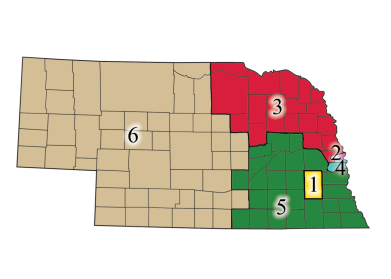Court of Appeals
In 1990, the Nebraska Legislature proposed a constitutional amendment that would create an intermediate Court of Appeals. In November 1990, the voters of the State of Nebraska approved the amendment, and the Court of Appeals was established on September 6, 1991.
The Court of Appeals consists of six judges appointed by the Governor from lists submitted by judicial nominating commissions. From the six judges, a chief judge is selected to serve a 2-year renewable term. The districts from which the Court of Appeals judges are appointed are the same as those used for the six Supreme Court justices. The Court of Appeals’ primary courtroom is in the State Capitol in Lincoln, but for the convenience of citizens, the Court of Appeals travels to other Nebraska cities to hear appeals.
The Court of Appeals is divided into two panels consisting of three judges each. The panels decide separate cases to expedite the processing of appeals. The composition of the panels changes periodically so that all the judges work with each other at some time.
The appeal process requires all cases (except cases in which a sentence of death or life imprisonment is imposed and cases involving the constitutionality of a statute) be appealed to the Court of Appeals rather than to the Supreme Court. In cases appealed to the Court of Appeals, a petition to bypass may be filed with the Supreme Court. If the Supreme Court deems it necessary, the petition will be granted and the case will be moved to the Supreme Court docket without first being heard by the Court of Appeals. Besides a petition to bypass, a petition for further review may be filed. This petition is filed after a case has been decided by the Court of Appeals and one of the parties involved is not satisfied with the ruling. The Supreme Court has the discretionary power to grant or deny the petition. If the petition is denied, the Court of Appeals’ ruling stands as the final decision. If the Supreme Court grants the petition, the case is then moved to the Supreme Court for review and disposition.

